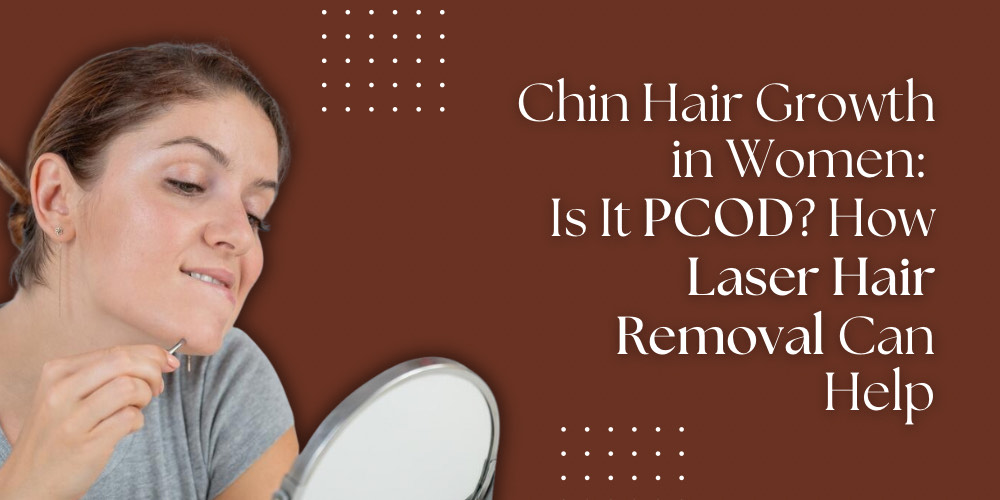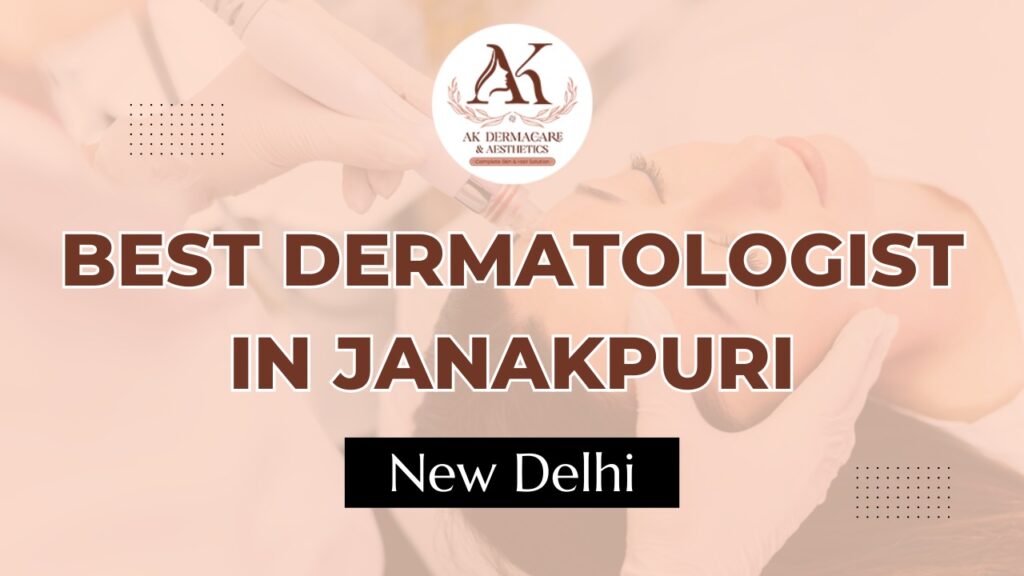Discovering unwanted hair growth on your chin, upper lip, or jawline can be distressing and confusing, especially when tweezing, threading, or waxing provides only temporary relief that lasts just days before stubborn regrowth returns. If you are experiencing persistent facial hair, this isn’t just a cosmetic inconvenience; it may be a visible sign of hormonal imbalances that affect approximately 5-10% of women of reproductive age, with polycystic ovary syndrome (PCOS) being the most common underlying cause.
Understanding the connection between chin hair growth patterns and hormonal conditions is crucial for addressing both the symptom and its root cause effectively. While facial hair in women can result from various factors, including genetics, medications, and other endocrine disorders, recognizing when it signals a treatable medical condition allows for comprehensive management that combines hormonal treatment with permanent solutions like laser hair removal face treatments.
What Is Hirsutism?
Hirsutism is the medical term for excessive hair growth in women following a male-pattern distribution, appearing as coarse, dark terminal hair in androgen-sensitive areas, including the chin, upper lip, chest, abdomen, back, upper arms, and upper legs. This condition differs from the fine, light vellus hair that naturally covers most of the body, instead producing thick, pigmented terminal hair that is longer, darker, and more noticeable.
Hirsutism affects approximately 5-10% of women of reproductive age, though prevalence varies significantly among different ethnic groups. Women of Mediterranean, Middle Eastern, and South Asian descent tend to experience higher rates of body hair growth compared to women of East Asian or Northern European ancestry due to genetic differences in hair follicle sensitivity to androgens.
The condition results from an interaction between elevated androgen (male hormone) levels and the inherent sensitivity of hair follicles to these hormones. When hormone-sensitive hair follicles are exposed to excess androgens, vellus hairs transform into terminal hairs that grow faster, thicker, and darker. The level and duration of androgen exposure, combined with local enzyme activity and follicle sensitivity, determine the severity of hair growth in each individual.
Understanding PCOS and Its Connection to Facial Hair
Polycystic ovary syndrome (PCOS), also known as PCOD (polycystic ovarian disease), represents the most common cause of hirsutism in women, accounting for the majority of cases alongside idiopathic (unexplained) hirsutism. This hormonal disorder affects 5-10% of women and occurs when the ovaries produce unusually high levels of androgens, causing a fundamental imbalance in reproductive hormones.
Despite its name, PCOS doesn’t require the presence of ovarian cysts for diagnosis—the “polycystic” appearance on ultrasound actually represents multiple small, immature follicles that failed to mature and ovulate due to hormonal disruption. The condition manifests through a constellation of symptoms, including irregular menstrual periods, weight gain, acne, fertility challenges, and most visibly, excessive facial and body hair growth affecting up to 70% of women with PCOS.
How PCOS Causes Chin Hair Growth
The mechanism behind chin hair growth involves complex hormonal interactions. When ovaries are stimulated to produce excessive androgens through elevated luteinizing hormone (LH) or hyperinsulinemia (high insulin levels), these male hormones circulate throughout the body. Elevated insulin levels increase gonadotropin-releasing hormone pulse frequency, promote LH dominance over follicle-stimulating hormone, boost androgen production, and decrease sex hormone-binding globulin (SHBG)—the protein that normally binds and inactivates androgens.
As free androgen levels rise, hormone-sensitive hair follicles on the face, particularly around the chin, upper lip, and jawline, respond by converting fine vellus hair into coarse terminal hair. Androgens also prolong the growth phase of body hair while paradoxically shortening the growth phase of scalp hair, which explains why some women with PCOS experience both facial hair growth and thinning hair on their heads.
PCOS Symptoms to Watch For
Beyond facial hair, PCOS presents with irregular or absent menstrual periods due to a lack of regular ovulation. Many women experience weight gain, particularly around the abdomen, as insulin resistance makes weight management challenging. Acne and oily skin result from increased sebum production triggered by elevated androgens. Fertility difficulties arise from irregular ovulation, making conception more challenging for women with PCOS. Some women develop dark patches of skin in body folds and creases, a condition called acanthosis nigricans related to insulin resistance.
Other Causes of Chin Hair Growth in Women
While PCOS represents the primary cause of hirsutism, several other conditions can trigger excessive facial hair growth and should be considered during medical evaluation.
Idiopathic Hirsutism
More than 85% of hirsutism cases result from either PCOS or idiopathic hirsutism—excessive hair growth with no identifiable medical cause. Women with idiopathic hirsutism typically have normal androgen levels, regular menstrual cycles, and no underlying endocrine disorders, yet their hair follicles demonstrate abnormal sensitivity to normal hormone levels. This genetic tendency runs in families but involves mechanisms that aren’t fully understood.
Congenital Adrenal Hyperplasia
Non-classical congenital adrenal hyperplasia (NCAH) is an inherited disorder affecting enzymes that regulate hormone production in the adrenal glands, leading to androgen overproduction. This condition typically appears in late childhood or early adulthood and is more common in specific ethnic groups, including Ashkenazi Jews, Eskimos, and French-Canadians. Elevated levels of 17-alpha-hydroxyprogesterone help diagnose this condition.
Cushing’s Syndrome
This rare condition develops when the body produces excessive cortisol, either from adrenal gland overproduction or long-term use of corticosteroid medications like prednisone. Beyond hirsutism, Cushing’s syndrome causes characteristic symptoms, including facial rounding, high blood pressure, easy bruising, and purple stretch marks.
Medication Side Effects
Several medications can trigger hirsutism as a side effect, including cyclosporine (immunosuppressant), testosterone preparations, minoxidil (hair growth treatment), danazol (endometriosis medication), certain progestins, phenytoin (seizure medication), and anabolic steroids. If your partner uses topical testosterone products, skin-to-skin contact can potentially transfer enough hormone to affect your hair growth.
Hormonal Changes During Menopause
The natural hormonal fluctuations during perimenopause and menopause can disrupt the balance between estrogen and androgens, sometimes leading to increased facial hair growth even in women who never experienced hirsutism previously.
Rare Androgen-Secreting Tumors
In very rare cases, tumors of the ovaries or adrenal glands can produce excess androgens, causing a sudden onset of severe hirsutism along with other masculinizing symptoms. These cases typically involve rapid progression and require immediate medical evaluation.
Diagnosing the Cause of Chin Hair Growth
Proper diagnosis begins with a comprehensive medical evaluation by an endocrinologist or dermatologist experienced in hormonal disorders. Your doctor will conduct a detailed medical history assessment covering menstrual cycle patterns, medication use, family history of hirsutism or PCOS, and timing of hair growth onset.
Blood tests measure hormone levels, including total and free testosterone, dehydroepiandrosterone sulfate (DHEAS), 17-hydroxyprogesterone, luteinizing hormone (LH), follicle-stimulating hormone (FSH), and sometimes cortisol and thyroid hormones. A pelvic ultrasound may be performed to visualize the ovaries and check for a polycystic appearance, though this finding alone doesn’t confirm PCOS diagnosis.
The diagnosis of PCOS typically requires meeting at least two of three criteria: irregular ovulation or menstrual cycles, clinical or biochemical signs of elevated androgens (including hirsutism), and polycystic ovaries on ultrasound.
How Laser Hair Removal Helps Women with PCOS and Hirsutism
Laser hair removal face treatments have emerged as one of the most effective long-term solutions for managing unwanted facial hair in women with PCOS and other causes of hirsutism. Unlike temporary methods that only remove visible hair, female laser hair removal face technology targets the hair follicle at its root, significantly reducing regrowth and improving both appearance and quality of life.
Why Laser Treatment Works for Hormonal Hair Growth
Even when androgen levels remain elevated due to PCOD cause chin hair growth patterns, laser treatment for chin hair can achieve a substantial reduction in facial hair by damaging the follicles’ ability to produce terminal hair. The laser’s concentrated light energy is absorbed by melanin in the hair shaft, converting to heat that damages the follicle’s growth structures without affecting surrounding skin tissue. While hormonal hair growth may be more persistent than regular hair, requiring additional sessions and maintenance treatments, most women achieve a 70-90% reduction in facial hair after completing a full female laser hair removal face treatment course.
Advantages Over Temporary Hair Removal Methods
Tweezing, threading, and waxing provide only temporary relief lasting days to weeks, and may actually stimulate more hair growth or cause ingrown hairs, scarring, and hyperpigmentation—particularly problematic for women with PCOS who often have darker, coarser facial hair. Laser hair removal face procedures eliminate the need for constant maintenance, reduce skin irritation and inflammation from repeated hair removal, prevent ingrown hairs and folliculitis common with other methods, and improve overall skin texture and appearance over time.
Combined Treatment Approach for Best Results
The most effective management of PCOS-related facial hair combines hormonal treatment to address underlying androgen excess with female laser hair removal face treatments to eliminate existing hair and prevent regrowth. Hormonal medications like birth control pills help regulate hormone production and reduce new hair growth, while laser treatment for chin hair targets existing follicles for permanent reduction. This dual approach provides both immediate cosmetic improvement and long-term hormonal management.
Treatment Expectations and Maintenance
Women with PCOD cause chin hair growth may require more laser sessions than women without hormonal conditions—typically 8-12 initial sessions rather than the standard 6-8. Ongoing hormonal stimulation from PCOS may necessitate periodic maintenance treatments every 3-6 months to address new growth from previously dormant follicles. However, even with maintenance requirements, laser hair removal face treatments dramatically reduce the daily hair removal burden and provide significant improvement in facial hair density and appearance.
Get Effective Treatment for Chin Hair Growth with AK Dermacare
At AK Dermacare in Janakpuri Delhi, Dr. Parul Garg and our specialized team understand the emotional and physical challenges that unwanted facial hair creates for women dealing with PCOS and other hormonal conditions. We provide comprehensive, compassionate care that addresses both the visible symptoms and underlying causes of hirsutism through advanced female laser hair removal face technology and medical expertise.
Our approach begins with a thorough evaluation to determine whether your chin hair growth stems from PCOS, other hormonal imbalances, or idiopathic causes. Dr. Parul Garg personally assesses your medical history, hormonal status, and treatment goals to develop a customized plan that may include referrals for hormonal management alongside laser treatment for chin hair procedures.
We utilize advanced laser systems specifically calibrated for facial hair removal, including delicate areas like the chin, upper lip, and jawline, where precision is essential. Our technology accommodates all skin types, ensuring safe, effective female laser hair removal face treatment, whether you have a fair or darker complexion. For women with PCOS, we understand that treatment timelines may extend beyond standard protocols, and we provide realistic expectations with personalized session scheduling to achieve optimal results.
Dr. Parul Garg’s medical supervision ensures proper management of any hormonal factors affecting your treatment response, with coordination of care when hormonal medications are indicated. Our gentle, professional approach recognizes the sensitive nature of facial hair concerns and provides a judgment-free environment where you can discuss your symptoms openly.
Ready to address unwanted chin hair and reclaim your confidence? Schedule your comprehensive consultation with Dr. Parul Garg at AK Dermacare today and discover how our integrated approach, combining laser hair removal face expertise, can provide both cosmetic improvement and medical insight into your facial hair growth. Our team will evaluate your specific situation, explain all treatment options, and create a personalized female laser hair removal face plan that delivers the smooth, hair-free skin you deserve.
Contact AK Dermacare now to book your appointment and take the first step toward permanent relief from unwanted facial hair with expert care that understands the hormonal complexities behind your concerns.
Frequently Asked Questions (FAQs)
1. Does chin hair growth always mean I have PCOS?
No, while PCOS is the most common cause of excessive facial hair in women, affecting up to 70% of those with the condition, not all chin hair indicates PCOS. Idiopathic hirsutism, genetic factors, certain medications, other hormonal disorders, and normal ethnic variation can all cause facial hair growth. Proper medical evaluation with hormone testing and assessment of other symptoms like irregular periods or acne helps determine whether PCOS or another condition is responsible. Dr. Parul Garg can help identify the underlying cause during your consultation.
2. Can laser hair removal cure my PCOS-related facial hair permanently?
Laser hair removal face treatments can achieve 70-90% permanent reduction of existing facial hair by damaging follicles, but women with PCOS often require ongoing maintenance treatments because continued hormonal stimulation may activate previously dormant follicles. The best results come from combining laser treatment for chin hair with hormonal management through medications like birth control pills or anti-androgens that address the underlying androgen excess. While not a complete “cure,” female laser hair removal face procedures dramatically reduce the daily hair removal burden and provide long-lasting improvement.
3. How many laser sessions will I need for facial hair removal with PCOS?
Women with PCOS typically require 8-12 initial female laser hair removal face sessions rather than the standard 6-8 sessions needed for non-hormonal hair removal, with sessions spaced 4-6 weeks apart. The elevated androgen levels driving ongoing hair production mean treatment must be more aggressive and sustained. Additionally, maintenance sessions every 3-6 months may be needed long-term to address new growth. Dr. Parul Garg will assess your specific hormonal status and hair characteristics to provide personalized treatment timelines during consultation.
4. Should I get my hormones tested before starting laser hair removal?
Yes, a medical evaluation is recommended before beginning laser hair removal face treatments for facial hair, especially if you have other symptoms suggesting a hormonal imbalance, like irregular periods, acne, or difficulty losing weight. Identifying and treating underlying conditions like PCOS not only improves female laser hair removal face treatment outcomes but also addresses important health concerns, including fertility, diabetes risk, and cardiovascular health. AK Dermacare can coordinate with endocrinologists or provide referrals for comprehensive hormonal assessment when needed.
5. What other treatments work alongside laser hair removal for PCOS facial hair?
The most effective approach combines laser hair removal face treatments for permanent hair reduction with hormonal treatments that address underlying androgen excess. Birth control pills regulate hormones and reduce new hair growth, anti-androgen medications like spironolactone block testosterone effects, and insulin-sensitizing drugs like metformin improve metabolic function in PCOS. Lifestyle modifications, including weight loss and exercise, also significantly improve hormonal balance. Dr. Parul Garg will recommend appropriate combinations based on your individual situation and can coordinate care with other specialists when hormonal treatment is indicated.



